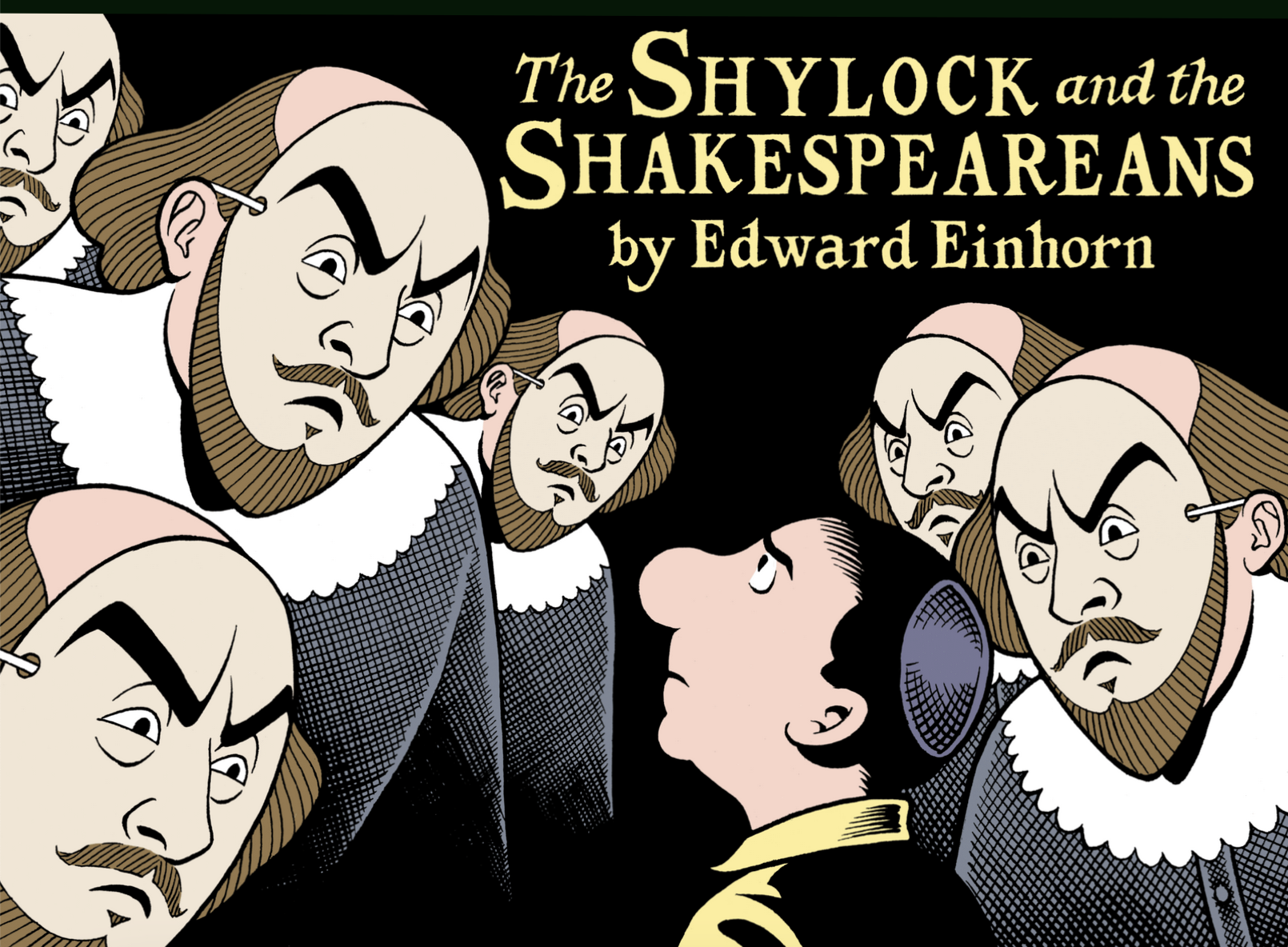The Shylock and the Shakespearians: The Merchant of Venice as a Voice against Antisemitism
By Sue Weston and Susan Rosenbluth – Two Sues On The Aisle
Twists on Shakespeare are nothing new; one of the great powers of the Bard is the way his work inspires others to re-set his plays to eras other than his own, put them to music, and, sometimes, use them as springboards for entirely new theatrical pieces that prompt thought, discussion, and arguments. In The Shylock and the Shakespeareans, playwright/director Edward Einhorn confronts bigotry head-on, using the words, characters, and somewhat the same story as in The Merchant of Venice.
While how successful he is can be argued, there is no question his (and Shakespeare’s) intentions were to take a richly, romantic theme and use it to explore justice, mercy, and the bonds that join people together. Shakespeare’s version portrays Jews as greedy moneylenders; to his credit, Mr. Einhorn takes issue not only with the image but also with the story and Shakespeare’s handling of it. Both Sues on the Aisle agreed that adaptations should be able to stand on their own, but only one of the Sues thought familiarity with The Merchant was “beneficial” to appreciating Mr. Einhorn’s piece; the other Sue said it bordered more on “crucial.”
It was presented last month at the New Ohio Theatre in Greenwich Village, the first in a series of thought-provoking, Jewish-themed theatrical performances the theater will offer in-person and virtually.
Contemporary Themes
Mr. Einhorn contemporizes the highly controversial classic, renaming the iconic Jew at its center and inserting the “Shakespeareans,” a masked gang of white supremacists, led by the Jew’s former clownish servant, Gobbo (Craig Anderson). One of the Sues thought the playwright may have been suggesting a correlation between former-President Donald Trump and Gobbo, which, she said, would be unfair in the extreme, positioning the arguably most philosemitic US leader as an antisemite.
Here, Shylock is Jacob, a diamond merchant, superbly played by Jeremy Kareken. As in the original, most of the scenes in which he plays are from his perspective, and when the Christians want to use an antisemitic slur, they call him “a shylock.”
Shylock and Jacob both resent the way the Venetian-Jewish community is libeled and treated. In Mr. Einhorn’s version, when Bassiano (Chapman Hyatt—and it’s Bassanio in the original) asks to purchase a diamond necklace from him on credit in order to gift it to his beloved Portia (Nina Mann), the Jew refuses. He doesn’t relent even when the young man’s friend, Antonio, a widely respected Venetian merchant (Eric Oleson), guarantees the loan.
Dramatic Shift with a Purpose
In a dramatic shift from the original, when Jacob finally—and reluctantly—agrees to take Antonio’s guarantee–without charging him interest–the Jew has only one demand: Antonio must “go to the Shakespeareans and tell them that we do not eat Christians.”
The bargaining scene with Jacob, Bassiano, and Antonio is an amalgam of Shakespeare and all-too-traditional antisemitism. When Bassiano tells Jacob if he is not paid, “you can take a bite out of my Christian flesh, from wherever you like,” the Jew responds, “More insanity.”
Antonio then corrects his young friend, telling Jacob, “Not his flesh! Mine. You can eat mine. Or cook it into matzah.” To which Jacob responds, “Matzah is just flour and water.” To which Antonio adds, “And Christian children.”
“Who told you that?” Jacob demands. “Shakespeare?”
In other words, in Mr. Einhorn’s retelling, it’s the two Christians who propose the infamous pound of flesh as collateral. And in this one fell swoop, the playwright turns the ancient antisemitic image on its head.
Classic Antisemitism
While the setting is “almost-ancient Venice,” the characters use modern vernacular and deal with issues that are as contemporary as the morning’s newspaper–white supremacy, anti-immigration sensibilities—intermingling them with classic antisemitic tropes, including the image of Jews with horns and the blood libel accusing them of draining Christians to make matzah.
Other recurring themes in Mr. Einhorn’s work are also those that are discussed today. A misspelled message scrawled on the walls of the set, “The Jews Will Not Replase Us,” is used to point out ignorance and fear not only of immigrants but also of anyone depicted as “other.” Stupidity and hypocrisy run rampant. The Venetian Christians claim “Jews and immigrants” will take their jobs, and the Shakespearians use this apprehension as justification for harassing Jews on the street and torching their homes.
“Time to kick them all out,” one Shakespearean says to another. “You don’t see them in England, anymore; they kicked them out years ago.”
When these Venetian thugs greet one another, they raise their hands and salute not Hitler but Shakespeare. The accepted response is: “Well met.”

Jacob (superbly played by Jeremy Kareken) pleading with daughter Jessica (the very talented Yael Haskal)
Jessica and Other Romances
Like in the original, Jacob has a daughter, Jessica (the very talented Yael Haskal), but here, she marries not a Venetian Christian but a first-generation Christian-Asian immigrant, still named Lorenzo (Chase Lee). In Shakespeare’s version, it can be argued that Jessica is the real villain of the piece, pushing her father to extremes such that he sees vengeance as his only option. She not only elopes with her Christian lover but also steals from her father in the bargain, mocking everything he holds dear: his faith and the ability to provide for his family and his community. She goes so far as to gloat about playing with a monkey, purchased by trading a ring given to Shylock by his beloved wife—her mother—Leah.
From a Jewish perspective, the original Jessica has no redeeming value—although some recent productions of the play have used stage directions to show her, in the end, abandoned and alone.
Mr. Einhorn’s Jessica also discards her Jewish heritage for what she says is true love, but not without attempting to explain herself to her father. In the end, she returns to the fold, relying on the muscle memory of kaddish (prayers for the dead) and kriah (rending her garments) to mourn the loss of her father and husband.
In this, Mr. Einhorn’s play can be viewed as an exploration of the eternal struggle facing diaspora Jewry. Often caught between embracing their Jewish identity and assimilating, they find the choice even more difficult when they are blamed for causing poor economic climates.
The other romances in Shakespeare’s original are also seen differently. Nerissa (Stephanie Litchfield) is still Portia’s devoted servant, but Mr. Einhorn gives the lowly maid laugh-out-loud wisecracks about the differences in their stations, especially when her mistress chooses the handsome Bassiano over her more intelligent and successful suitors.
If over the years, Shakespearian analysts have pondered the relationship between Antonio and Bassiano (just friends, father and son, lovers), Mr. Einhorn makes no bones about it. His Bassiano may be in love with Portia, but the older Antonio agrees to guarantee his loan because the older man is sexually attracted to the younger one—an appeal Bassiano has no desire to shut down.
What Was Shakespeare Saying?
In 1596, when Shakespeare wrote The Merchant of Venice, Jews had been banished and banned from England for over 300 years. It is almost certain Shakespeare never met a Jew. For centuries, his depiction of Jews as materialistic, greedy, jealous, vengeful, and obsessed with money was said to be based on the culturally accepted stereotypes of his day, which, some historians say, reflected Shakespeare’s own views. The common consensus that Shakespeare was an antisemite explains why The Merchant was such a favorite in Nazi Germany.
Over the years, other analysts have argued that the issues tackled by the play and speeches in it point to a more complex, nuanced view of Jews by Shakespeare—not through any personal knowledge but because the Bard’s humanity and basic understanding of people would not permit a cardboard representation of what he had to see as a challenge.
Eight years before Shakespeare wrote The Merchant, his contemporary, Christopher Marlowe, presented his play, The Jew of Malta, in which Barabas (whose daughter, Abigail, leaves Judaism to become a nun) is nothing more than a one-dimensional monster. By contrast, Shakespeare’s play can be seen as a condemnation of the moral and ethical values of Elizabethan Christians in their hypocrisy as demonstrated by their treatment of Jews.
Mr. Einhorn splits the difference. He acknowledges Shakespeare’s unfortunate reputation as a hater of Jews but shows the playwright, whose identity the white supremacist band has adopted, as the writer of Shylock’s iconic monologue: “Hath not a Jew eyes?” Shakespeare himself recites it in Mr. Einhorn’s play, wearing a fake-Jewish nose. In the original play, the soliloquy is often referenced as a way to show Shakespeare’s humanity, his inability to see anyone as just one-sided. For Mr. Einhorn, the speech is a condemnation of bigotry.
Theater at Its Best
In this, The Shylock and the Shakespearians can be seen as shining a light on the spread of unfounded discrimination and hatred. For the Sue who didn’t think familiarity with the original was necessary to appreciate Mr. Einhorn’s work, the play offered insights into the penchant of some people to deflect blame, spread rumors, and engage in hatemongering. Both Sues agreed that for those who know the Shakespearian story, Mr. Einhorn’s characters make the themes he sought to highlight even more outlandish.
Theater at its best should be provocative and edgy, and by that measure, the New Ohio Theater hits all the right buttons. It is Off-Broadway as it was intended to be, challenging established norms and introducing new scripts and playwrights. Happily, the theater company accommodates both virtual and in-person audiences.
While live—and Zoom—performances ended in June, tickets to The Shylock and the Shakespeareans are available on demand through July 17.
Mr. Einhorn sees antisemitism as not only baseless but as a disease that must be addressed and stopped. He has used the medium of theater to bring this message to the masses, which is why, whatever its faults, The Shylock and the Shakespeareans should be seen.
*******
Two Sues on the Aisle bases its ratings on how many challahs (1-5) it pays to buy (rather than make) in order to see the play, show, film, book, or exhibit being reviewed.
The Shylock and the Shakespeareans received a 4 Challah rating







